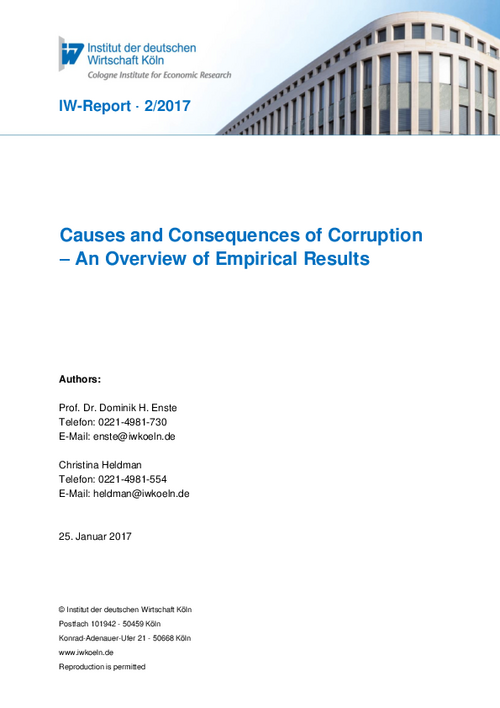Corruption is a main threat in many countries around the world. Therefore, the causes and consequences of corruption are analyzed in various empirical studies. Since the results are quite mixed, we have summarized the findings of the central empirical literature from the last two decades for a comprehensive overview.

Causes and Consequences of Corruption: An Overview of Empirical Results
IW-Report

Corruption is a main threat in many countries around the world. Therefore, the causes and consequences of corruption are analyzed in various empirical studies. Since the results are quite mixed, we have summarized the findings of the central empirical literature from the last two decades for a comprehensive overview.
Main causes for corruption are according to the studies (1) the size and structure of governments, (2) the democracy and the political system, (3) the quality of institutions, (4) economic freedom/ openness of economy, (5) salaries of civil service, (6) press freedom and judiciary, (7) cultural determinants, (8) percentage of women in the labor force and in parliament (9) colonial heritage and (10) the endowment of natural resources. Corruption has an impact on (1) investment in general, (2) foreign direct investment and capital inflows, (3) foreign trade and aid, (4) official growth, (5) inequality, (6) government expenditure and services, and (7) shadow economy and crime.

Dominik Enste / Christina Heldman: Causes and Consequences of Corruption – An Overview of Empirical Results
IW-Report


EU-Lieferkettengesetz: Gravierende Folgen für Entwicklungsländer
Heute unternimmt die belgische Ratspräsidentschaft einen erneuten Versuch, eine Mehrheit für das EU-Lieferkettengesetz zu finden. Trotz Nachbesserungen drohen immer noch erhebliche Nachteile – nicht nur für die europäische Wettbewerbsfähigkeit, sondern auch ...
IW
Spenden: Jung, gebildet, gutverdienend und großzügig
Im vergangenen Jahr spendeten die Deutschen rund 15,5 Milliarden Euro – deutlich mehr als noch im Vorjahr. Das ist das Ergebnis einer neuen Studie des Instituts der deutschen Wirtschaft (IW). Frauen spendeten häufiger als Männer. Besonders großzügig waren 18- ...
IW